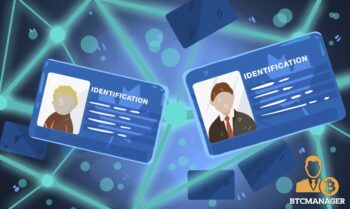2023-1-19 18:14 |
The blockchain, what it is and how it works. The problem of identity theft for blockchain-based businesses. How blockchain helps businesses tackle the issue of identity theft.
Blockchain‘s rising popularity may be attributed to its promise of safe monetary operations and the elimination of identity theft.
There will be astronomical yearly expenditure on the blockchain, estimated at $20 billion, with the banking industry alone contributing about $522 billion. Then why is everyone talking about it? Blockchain is favored by both users and businesses because of its ability to securely store user data.
Visualize the magnitude of identity theft on a worldwide scale. Unfortunately, victims of identity theft often don’t find out until they experience severe consequences. If online stores don’t take identity theft seriously, they risk losing customers and damaging their image. Blockchain gives individuals more control over their data and a more secure way to avoid identity theft.
The blockchain: What is it?Blockchain is a network of technologies designed to securely gather user data and distribute it over the internet in chunks. The blocks are a network of data centers that conduct safe public transactions using encryption. Each transaction in a chain must be recorded in a distributed ledger.
A problem for blockchain-based businesses: Identity theftCustomers aren’t the only ones who suffer from identity theft; internet companies are at risk as well. To achieve their goals, cybercriminals use a wide variety of tactics, such as hacking, account takeovers, and credit card theft. Examples of a few of the most typical forms of identity theft are shown below.
The scam of fake IDsSynthetic identity theft occurs when several victims’ personal information is used to create a single fraudulent persona. To complete the operation, it is common practice to combine fake information with real user records that have been stolen. Criminals create new identities to engage in other fraudulent schemes. For instance, cybercriminals may create phony profiles in order to seem affiliated with legitimate companies and launder money using these accounts.
Online shopping fraudCon artists prey on those who make purchases on digital platforms, making online purchasing dangerous. People of dubious provenance populate these online marketplaces, hoping to mislead customers into giving over their credit card data. With the use of enticing offers and phishing emails, imposter online shops can trick unsuspecting customers into giving over their personal information.
Identity theft in the healthcare industryInsurance companies and hospitals must be on the lookout for cunning scammers who steal people’s medical identities.
The theft of a patient’s medical identification information might provide the perpetrator with access to sensitive medical information that can be sold for profit. Since there aren’t any foolproof identity verification systems in place when patients register or make insurance payments, this kind of scam often goes undetected.
Theft of social security numbersA further method of committing identity theft is through using stolen Social Security numbers (SSNs).
The nine-digit SSN is a form of identification that is typically given to people at birth. Online scams like medical and kid identity theft would be impossible without them. Cybercriminals often use social security numbers to acquire the suspect’s accounting transactions and file fraudulent tax returns.
Avoiding identity theft with blockchainThere are a few ways in which blockchain technology improves security for user data and prevents fraudulent identities from being accepted into the system. The following are examples of some of these:
Providing a safe and sound method of financial transactionsWhen it comes to fighting identity theft, blockchain is generally seen as a potential cybersecurity solution. Due to the high degree of security it offers, it may aid in preventing private information from falling into the wrong hands. Blockchain’s distributed ledger is an electronic database that stores transactional data. Data saved on the blockchain is secured by employing encryption techniques to ensure the privacy of all users’ data.
We should have safeguards in place to prevent any kind of theft or breach into the system from happening and they are activated the moment they are spotted. As a result, customers of online services may deal with confidence knowing that their personal information is being protected.
Using ID verification tools like Bitcoin loophole or Chainanalysis, distributed ledger technology (DLP) in blockchain may validate customers’ identities across different channels.
The snackable wall against fraudAn attacker may easily compromise a centralized network and remain undetected for long periods. Identity verification systems are very vulnerable to a single point of failure, which may result in the loss of millions of dollars by giving criminals access to sensitive information such as credit card numbers, Social Security numbers, and other personal details.
With blockchain, the situation is quite different since identity thieves have to physically move from one location to another, which takes a lot of time and energy.
Blockchain employs Public Key Cryptography (PKI) to build a decentralized, digital network comprised of individual blocks of data. PKIs are crucial because they prevent widespread data breaches and safeguard individuals’ personal information.
Title to individual dataSynthetic identities are used by cybercriminals to impersonate legitimate businesses and get access to sensitive information, such as credit card and bank account details. Banks lose a significant amount of money due to identity theft every year, and the number of cases is rising.
Bad credit, massive credit card debt and flags from financial authorities are all possible outcomes.
To circumvent this issue, blockchain technology provides public keys that may be used to initiate a safe transaction between two parties. Users gain control over their data when, for example, personal details such as their birthdays are recorded in a distributed ledger. This provides an extra safeguard for all of your digital chats.
Last but not leastProtection against identity theft is crucial for businesses of all stripes. Know your customer (KYC) and anti-money laundering (AML) rules can be easily implemented via client identification verification, which also helps reduce the costs of cybercrime.
Companies in the blockchain industry may use ID verification services to quickly and easily add new users. Identity verification service providers in the blockchain industry may use this to speed up the onboarding process for new customers.
Blockchain companies may meet global KYC and AML criteria and secure their customers’ loyalty by providing IDV solutions powered by AI.
The post The Problem of Identity Theft And Blockchain Era – Ways to Address It appeared first on CoinJournal.
origin »Bitcoin price in Telegram @btc_price_every_hour
High Performance Blockchain (HPB) на Currencies.ru
|
|





























